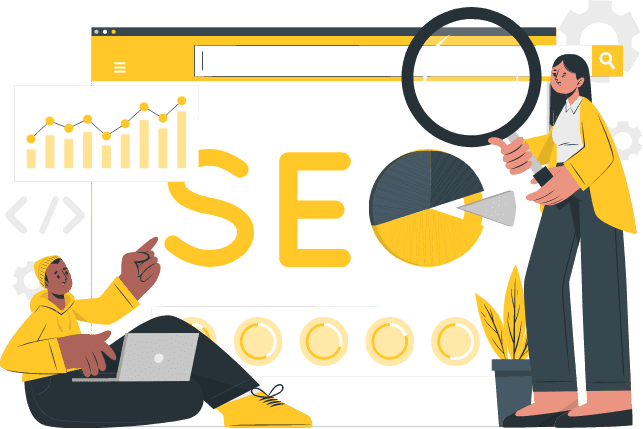
- May 30, 2023
Single Page Websites and SEO: A Good or Bad Combination?
Almost all SEO strategies entail launching several web pages. This is clearly the best course of action in the majority of cases, but can an SEO campaign with a single page website be successful? In this blog, we will discuss what a single page website is, and review whether it is good or bad for SEO.
What Is a Single Page Website?
All of the website's content can be found only on one landing page of a single page website. The user is unable to access content on different URLs via internal linking, in contrast to multi-page websites. A single page website essentially does what it says. However, it shouldn't be mistaken for a single-page application (SPA). When a visitor initially sees a website, a SPA loads all of the files through a web document. The remaining content is then dynamically loaded as and when a user interacts with the website. The user can still technically visit different pages within a SPA. To dynamically serve the new content, these are typically rendered “client-side” via JavaScript.Why Single Page Websites Are Good for SEO
Better Mobile Experience
Google announced in 2019 that they are working to switch to a mobile-first indexing model, thus having a website that functions effectively on mobile is essential. One of the main benefits of the single-page design is that users find the sites easy to navigate and that the sites typically convert to mobile devices much more easily. When compared to multi-page sites, single-page sites load much faster. It is a huge bonus for most users who do not have the patience to wait more than a few seconds for a site to load. A single page website is a blessing for those with thicker fingers because some people find it challenging to click on additional pages or tabs on small devices like smartphones.Target a Specific Audience
Single-page websites are excellent for focusing on a certain audience and giving them a particular kind of user experience. If you don't have to worry about people clicking on multiple pages, potentially in the wrong order, it's simple to manage their behavior on your site and direct them in a specific way. With a single-page site, you can offer users with all the information you want them to see, in whichever order you see fit for your business. If you are simply concerned about targeting a single keyword or set of keywords, this can be significant in terms of SEO.Page Rank
A single-page website has the advantage that every link it acquires will direct to the main URL, ensuring that there is always a 1:1 ratio of links to pages. Links are one of the primary elements that influence how high a website ranks.Why Single Page Websites Are Bad for SEO
 You should typically launch your website with more than one page. Single page websites have a limited ability to increase organic traffic.
Here are our top reasons why single-page websites aren’t good for SEO.
You should typically launch your website with more than one page. Single page websites have a limited ability to increase organic traffic.
Here are our top reasons why single-page websites aren’t good for SEO.
Keyword limitation
One of the major obstacles to single page websites is keyword ranking. Any website page may typically only be optimized for a single phrase with SEO, which stands for search engine optimization. Single page websites can only target a single phrase because they are built around a single topic or theme. On the other hand, multi-page websites are not constrained by this and have a greater opportunity of improving their search engine optimization because they have more pages. It increases the likelihood that search engines will show the site by allowing each of its web pages to focus on a specific keyword or phrase. This could be essential for businesses with a competitive online presence where each key phrase counts.Lack of specific content
Since there isn't enough room or a way to create separate pages for each topic, single page websites are typically tougher to find specific content. Everything must be displayed on a single page. It will be difficult for a single page website to display more necessary content should a visitor need to know more about a product, idea, or piece of content featured on the site. For a visitor who would want to see particular information on the website, this lack of relevant content can be frustrating. The metadata of a single page website would be an additional consideration. A single page website only needs one title tag and one description because it only has one set of metadata. The website can only create one title tag because there are no other pages on it. As you only have one chance to capture their attention, this lessens your chances of attracting visitors to your website. This restricts how much specialized content the website can have or display. On the other hand, a multipage website can include metadata for all of the different web pages that it has, increasing the amount of specialized content it may wish the online user to have access to.Advanced SEO practices
Multi-page websites can divide their web pages into parts (categories) and subsections to better show content in addition to the ability to create more specific content. These subcategories or subsections can be other pages on the website, which can be further broken down into more subsections. This enables the display of all relevant data regarding an item, product, or idea. To provide the visitors or web users with as much information as possible, this is done. This process is called ‘siloing’ which is considerably simpler to do on a multipage website than it is on a single page website. If there are several topics to cover or other content to display, it will be challenging for a single page website to display as much content on a particular topic. The one-page website will get clogged and disorganized.Loading time
When a website only has one page and includes flash videos, images, texts, parallax effects, and other information, the page might become heavy and load more slowly than a website with multiple pages. Visitors and web users who do not have the patience to wait for the entire website to load on a single web page might be turned off by this. As one of their criteria in ranking websites, SEO will not rank websites that take a long time to load highly on their search engines. Contrarily, a multipage webpage can load much more quickly because the information is dispersed over multiple pages. On-page optimization is crucial since in the world of SEO, loading speed plays a significant role in ranking.Lack of Links
SEO favors websites with adequate internal and external links. As there is only one webpage for a single page website, there are limits on how many internal links can be added. The only ability of these links is to jump to another section of the same page. With a single page website, it is impossible to link to another page. Since this could quickly take the visitor away from their website, single page websites also frown against having external links. This drawback does not apply to multi-page websites because they can have a large number of internal links because they are not constrained by the number of pages they have. Additionally, having external links improves the SEO ranking of the site. Single page websites do have a place in the market, even though they can be spotty and are currently popular, but it's vital to realize that they are not the best for SEO. When choosing a single page website, much consideration should be given. Considerations should be made for factors like the target demographic, the market, and the need of the website. Since most online visitors rarely explore past the first or second search result page, businesses aim to rank highly in Search Engine Result Pages (SERPs). This implies that your online presence might not be felt if you don't rank well in the SERPs.Tips for Optimizing a Single Page Website
 We've now discussed the benefits and drawbacks of running a single-page website (in terms of SEO).
Here are our top SEO suggestions for creating and running a single-page website, if that's the best option for you right now.
We've now discussed the benefits and drawbacks of running a single-page website (in terms of SEO).
Here are our top SEO suggestions for creating and running a single-page website, if that's the best option for you right now.
Use a clear hierarchy
Single page websites often lack the clear architecture that navigation menus and breadcrumbs provide. In light of this, you should set a clear on-page hierarchy for your content. A good place to start is with a logical heading structure that uses an H1 for the main heading and H2s and H3s for the subheadings. Users can more easily scan and browse the page if you use these header tags to break up your content in a sensible sequence. When navigating the website, having a messy heading structure forces the user to comprehend the page layout. Avoid skipping any heading levels (such as nesting an H4 immediately under an H2) as this is especially critical for users who are visually impaired and may be using a screen reader.Don’t overlook image optimization
In SEO, image optimization is often disregarded. Image SEO should not be overlooked given how many images single-page websites have on average. Single-page websites are subject to the same rules as other websites, so make sure to follow best practices such as:-
-
- Using next-gen file types and compressing image file sizes
- Using descriptive file names and alt text.
- Loading images via a Content Delivery Network (CDN).
-
Don’t neglect page speed
This brings us nicely to our next piece of advice: don't ignore page speed. Make sure it loads quickly and is responsive because that will be the only page your users will access. Page speed isn't the main priority for SEO, despite the fact that there are hundreds of ranking factors in use. However, it's difficult to deny that having a quick and responsive website promotes both user experience and organic rankings. According to Think with Google, if a mobile site takes longer than three seconds to load, 53% of visits are abandoned. When you put these points together, you can see why it's important to keep page speed in mind. For single-page websites, below-the-fold content that loads slowly should be a major factor. This is due to the fact that you'll probably be cramming more content than normal onto a single page, which will weigh down page load times. This implies that any resources that call for scrolling will cause a delay in the initial page load. Instead, as the user scrolls, these resources will load.Double down on link building
Single-page websites have trouble pulling backlinks naturally. With this in mind, link building will probably require even more of your time than usual. You'll need to double down on strategies that don't involve adding new pages. This is due to the fact that you are unable to launch pages specifically designed to attract links, for instance, utilizing strategies like link baiting.Follow on-page best practices
Our final piece of advice is really straightforward, but it's also arguably one of the most important. It's essential to adhere to on-page SEO best practices. The limitations of having only one page will prevent you from doing some things, such as internal linking. With that being said, it is still crucial to optimize key on-page elements, from keyword targeting to meta titles and meta descriptions.Final Thoughts
Single-page websites aren’t for everybody. We personally will choose a multi-page setup in the majority of situations. Nevertheless, there are situations in which a single-page website makes sense, especially as a temporary fix or MVP version of a website. You can get in touch with us if you’re looking for an affordable SEO company in Kolkata.Our Office

USA
Seattle
2515 4th Avenue, Centennial Tower Seattle 98121
United States Of America
ratnesh.singh@sbinfowaves.com
+1-7543-335-140

Australia
Sydney
Rubix Alliance Pty Ltd Suite 305/30 Kingsway, Cronulla NSW 2230
dhiraj.accounts@sbinfowaves.com
+6-1480-023-313

India
Kolkata
Adventz Infinity, Office No - 1509 BN - 5, Street Number -18 Bidhannagar, Kolkata - 700091 West Bengal
dibyendu.mondal@sbinfowaves.com
+91-8240-823-048
India
Bengaluru
KEONICS, #29/A (E), 27th Main, 7th Cross Rd, 1st Sector, HSR Layout, Bengaluru, Karnataka 560102
pradipta@sbinfowaves.com
+91-9804-360-617
Unleash the Sales Beast Within and Watch Your Revenue Soar!
GET A FREE ANALYSIS OF YOUR WEBSITE NOW!









